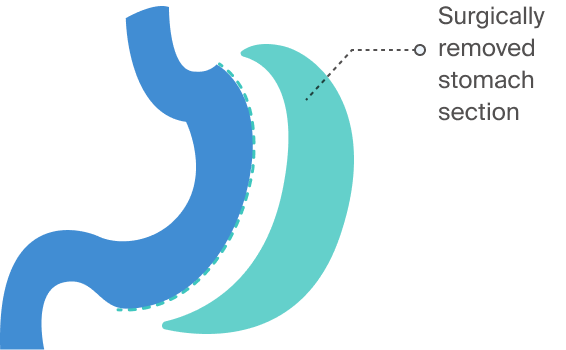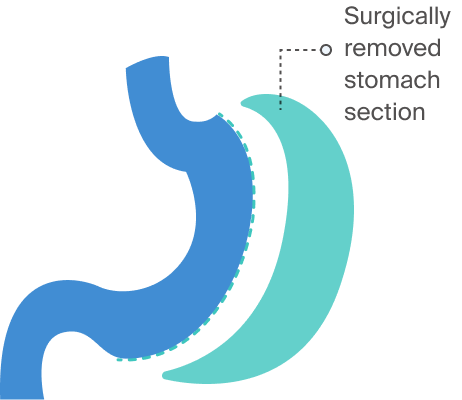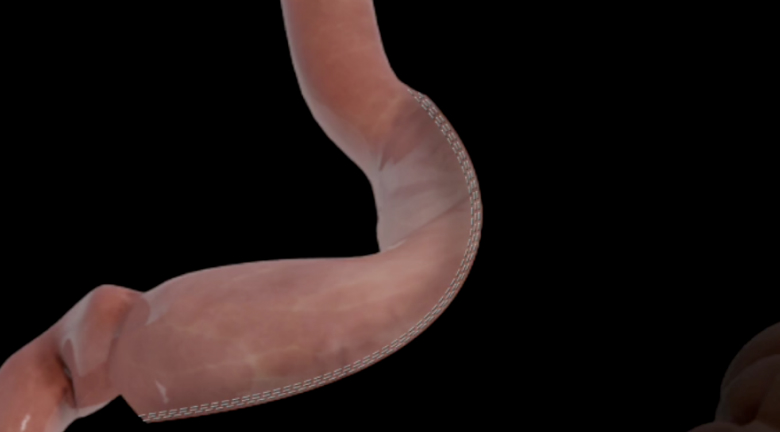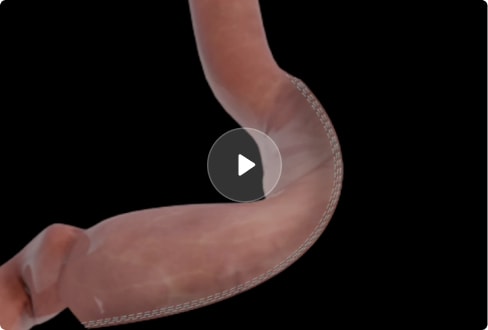Gastric Sleeve
The sleeve gastrectomy helps you lose weight by reducing the size of your stomach so you eat less and feel full faster.

Before
Gastric Sleeve


After

Losing Weight With Gastric Sleeve
Gastric sleeve surgery (or vertical sleeve gastrectomy) is the most common weight loss procedure performed in the US, and the most frequent bariatric surgery performed at the New Jersey Bariatric Center®.
The gastric sleeve procedure jump starts weight loss by removing a portion of the stomach and narrowing the remaining parts to the size of a banana or a thin vertical “sleeve.” A smaller sized stomach leaves you feeling fuller on much smaller portions of food and allows for normal digestion of nutrients. The procedure also causes the secretion of fewer hunger hormones – grehlins – resulting in less overall hunger leading to weight loss. On average, patients lose between 40-70% of their excess body weight as early as 12 months after.
The gastric sleeve procedure jump starts weight loss by removing a portion of the stomach and narrowing the remaining parts to the size of a banana or a thin vertical “sleeve.” A smaller sized stomach leaves you feeling fuller on much smaller portions of food and allows for normal digestion of nutrients. The procedure also causes the secretion of fewer hunger hormones – grehlins – resulting in less overall hunger leading to weight loss. On average, patients lose between 40-70% of their excess body weight as early as 12 months after.
How Much Weight Can I Lose With Gastric Sleeve?
Your Potential Weight Loss with Gastric Sleeve
- lbs.*
*On average, patients lose between 40-70% of their excess body weight as early as 12 months after gastric sleeve surgery.
*As with all weight loss results vary based on several factors, including compliance with post-operative plan and behavior guidelines.
*Bariatric Surgery Procedures. (n.d.). In American Society for Metabolic and Bariatric Surgery. Retrieved December 3, 2020 from https://asmbs.org/patients/bariatric-surgery-procedures#learnmore
*Bariatric Surgery Procedures. (n.d.). In American Society for Metabolic and Bariatric Surgery. Retrieved December 3, 2020 from https://asmbs.org/patients/bariatric-surgery-procedures#learnmore
Health Improvements and Benefits
Health Benefits
The gastric sleeve procedure results in sustained, long-term weight loss and improves, and in some cases resolves, obesity-related illnesses such as:
77%
Type 2 Diabetes
77% of patients have resolution2
62%
Hypertension
62% of patients have resolution2
84%
Sleep Apnea
84% of patients have resolution2
With type 2 diabetes, many patients stop taking their diabetic or high blood pressure medication before they leave the hospital and before weight loss. With sleep apnea, there is improvement, and often complete resolution as weight loss results in the opening of air passages.
Side Effects & Risks
As with any surgery, there are also side effects and risks to consider with weight loss procedures. When deciding whether gastric sleeve surgery is right for you, the potential health benefits must outweigh the potential risks. To learn more about specific complications associated with this procedure, visit our Side Effects & Risks page.
Learn MoreDo I Qualify for Gastric Sleeve Surgery?
To qualify, a body mass index (BMI) of 40 or greater or a BMI of 35 with obesity-related conditions such as diabetes, high blood pressure or sleep apnea should exist.
Calculate Your BMI

Gastric Sleeve Procedure
At New Jersey Bariatric Center® gastric sleeve surgery is performed laparoscopically and robotically. First, small incisions are made in the abdominal wall and the procedure is performed using a video camera (laparoscope). The surgeon then removes 75-80% of the stomach, reducing the remaining part to a capacity of 3 – 4 ounces, resulting in patients feeling fuller, faster with small portions of food. The procedure lasts approximately 1-2 hours and patients generally stay in the hospital for 1 day.
Request an AppointmentRecovery & Follow Up
Recovery time after surgery is important. Due to the minimally invasive nature of laparoscopic and robotic gastric sleeve surgery, patients can expect to stay in the hospital for at least one day after surgery.
When planning for the period after surgery you will have the support of our dedicated team of medical professionals who will work with you on nutrition, exercise, and psychological needs both before surgery and for the long-term.
Learn MoreWhen planning for the period after surgery you will have the support of our dedicated team of medical professionals who will work with you on nutrition, exercise, and psychological needs both before surgery and for the long-term.
Patient Stories
Suzanne Lost 125 lbs with Gastric Sleeve*
Brian Lost 105 lbs with Gastric Sleeve
Timika Lost 101 lbs with Gastric Sleeve*
Gastric Sleeve FAQs
To qualify you must have a body mass index (BMI) of 40 or greater or a BMI of 35 or greater with one or multiple obesity-related health problems such as type 2 diabetes, sleep apnea and high blood pressure. Once you qualify, one of our fellowship-trained surgeons can help you determine if this procedure is right for you.
While all surgical procedures have risks, gastric sleeve surgery has been found to be one of the safest surgeries when compared to other surgeries. At the New Jersey Bariatric Center, our gastric sleeve procedures are done laparoscopically with small incisions to subsequently reduce the risk of complications. In general, weight loss surgery has complication and mortality rates (4% and 0.1%, respectively) comparable to some of the safest and most commonly performed surgeries in the U.S. including gallbladder surgery, appendectomy and knee replacement.
Source: Metabolic and Bariatric Surgery. (2018, October). Retrieved September, 2020 from http://asmbs.org/resources/metabolic-and-bariatric-surgery
Source: Metabolic and Bariatric Surgery. (2018, October). Retrieved September, 2020 from http://asmbs.org/resources/metabolic-and-bariatric-surgery
Weight loss surgery, and significant weight loss in general, reduces or resolves many obesity-related conditions such as type 2 diabetes, hypertension and sleep apnea. With gastric sleeve surgery 77% of patients with type 2 diabetes, 62% of patients with hypertension and 84% of patients with sleep apnea have resolution. Decreasing excess body weight not only improves obesity-related conditions but also physical, mental and social well being.
The gastric sleeve procedure removes more than 75-80% of the stomach, reshaping the remainder of it into a sleeve similar to the size and shape of a banana. Due to the characteristics of the procedure, it is unable to be reversed.
Patient Journey
Interested in gastric sleeve surgery? Visit our patient journey page to learn about the next steps.
Patient JourneySources:
1. Gastric sleeve surgery. (n.d.). In Cleveland Clinic. Retrieved November 11, 2020, from https://my.clevelandclinic.org/departments/bariatric/treatments/gastric-sleeve
2. Metabolic and bariatric surgery. (2018, October). In American Society for Metabolic and Bariatric Surgery.
Retrieved November 10, 2020, from https://asmbs.org/resources/metabolic-and-bariatric-surgery
1. Gastric sleeve surgery. (n.d.). In Cleveland Clinic. Retrieved November 11, 2020, from https://my.clevelandclinic.org/departments/bariatric/treatments/gastric-sleeve
2. Metabolic and bariatric surgery. (2018, October). In American Society for Metabolic and Bariatric Surgery.
Retrieved November 10, 2020, from https://asmbs.org/resources/metabolic-and-bariatric-surgery








